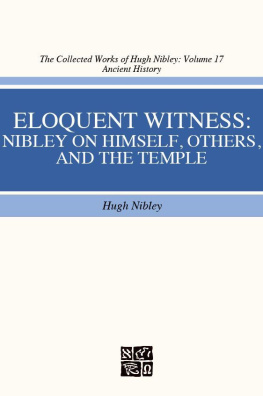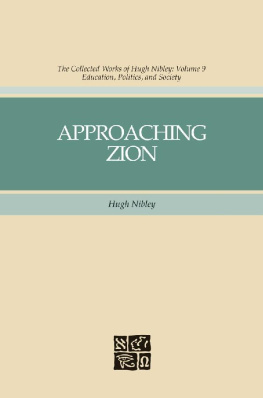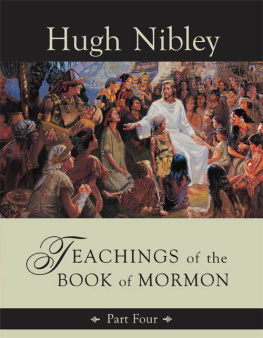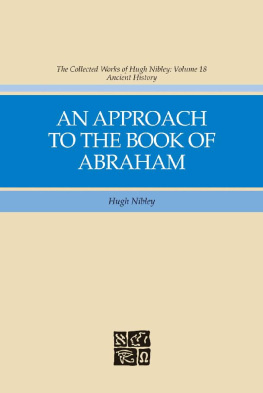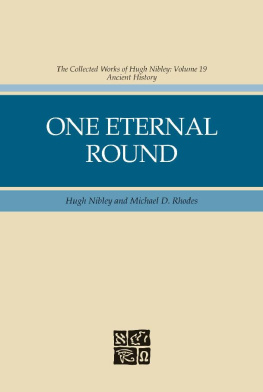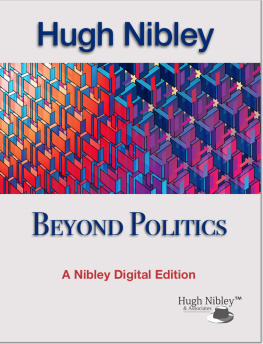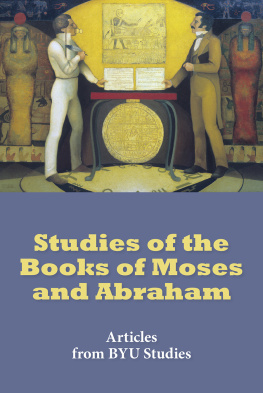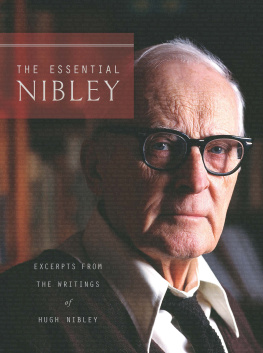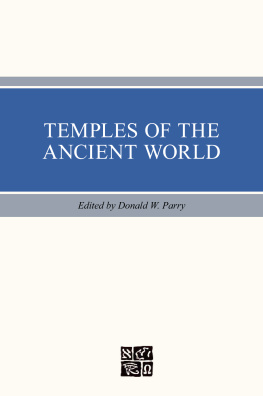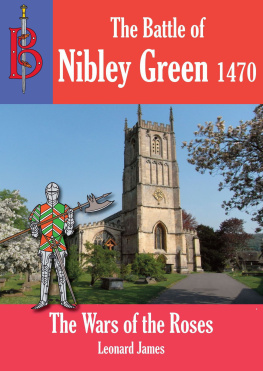Collected Works of Hugh Nibley
Eloquent Witness
Nibley on Himself, Others, and the Temple
Hugh Nibley
2008 Deseret Book Company.
All rights reserved. No part of this book may be reproduced in any form or by any means without permission in writing from the publisher, Deseret Book Company, P.O. Box 30178, Salt Lake City Utah 30178. This work is not an official publication of The Church of Jesus Christ of Latter-day Saints. The views expressed herein are the responsibility of the author and do not necessarily represent the position of the Church or of Deseret Book. Deseret Book is a registered trademark of Deseret Book Company.
Table of Contents
Key to Abbreviations
Autobiographies
Interviews
Reviews by Hugh Nibley
Forewords by Hugh Nibley
Personal
Temples
Key to Abbreviations
CWHN The Collected Works of Hugh Nibley JNES Journal of Near Eastern Studies
PG J.-P. Migne, ed., Patrologiae Cursus Completus... Series Graeca, 161 vols. (Paris: Garnier, 185766)
PL J.-P. Migne, ed., Patrologiae Cursus Completus... Series Latina, 221 vols. (Paris: Garnier, 184464)
ZS Zeitschrift fr gyptische Sprache und Altertumskunde
Foreword
I first became acquainted with Hugh Nibleys writing as a studious and highly energetic young man in California. When I was thirteen, I read Nibleys The World and the Prophets, which tells in simple, straightforward, yet eloquent language of the loss of authority in the early Christian church. As clearly as anything, Nibley makes the case for the triumph of the philosophers and the discomfiture of apostolic authority. The ideas in The World and the Prophets set my mind on fire. Nibley became my academic idol and has remained so to this day. Nibleys example of serious scholarship in the service of the kingdom made me want to become an academic as well. Though the path I have followed has been somewhat different, he blazed the trail for me.
I first met Nibley formally after having come up to BYU with my parents in the spring of 1968. He was housed at BYU in one of the long, narrow offices in the old Joseph Smith Buildingan office that was nothing more than a glorified and enlarged walk-in closet with high ceilings. My father had known Nibley personally during the 1930s while they were doctoral students at the University of California at Berkeley and had some interesting stories to tell about him. Even as I was being introduced to him, Nibleys level of absorption in the subject he was working on put him in a trancelike state. I asked him for some advice on where to study about the ancient world in graduate school. Without a moments hesitation he said, Study at Brandeis with [Cyrus H.] Gordon. Though I didnt take him up on his suggestion (like Nibley, I took my Ph.D. at Berkeley), I have much appreciated Gordons imagination, creativity, and willingness to take a risk, traits that Nibley greatly admired. (This encounter, however, was probably not the first time that I had ever seen Nibley: I have vague recollections of him sitting on the stand to speak at the old Berkeley Ward chapelhe was a visiting professor at Berkeley in 1960 when I was a young boy.)
Hugh Nibley was a man of profound learning. Nibleys brief (and slightly impersonal) sketch of his academic career that appears in this volume does not take note of the spectacular intellectual abilities that he demonstrated early in his life; his passionate attachment to, and capacity for, focused library work; and his astonishing ability to concentrate on a topic to the exclusion of everything else. One anecdote illustrates this: my fathers friend, Dil Jensena fellow Latter-day Saint who himself was studying toward a Ph.D. in the life sciencessaw Nibley walking down the street toward the university library engrossed in a book; he leaned out the window of his apartment, caught Nibleys attention, and asked him if he had eaten. Nibley, distracted from his reverie, looked at his watch, noted the hour, and said, Oh, its 6:15, so I must already have eaten, but thanks anyway. He then opened up the book and started reading again as he continued on his way to the library.
Even as a young man, Nibleys gifts were already becoming evident. He wrote highly praised poetry, his drawings as a teenager are admirable, and he was an accomplished pianist and organist. My father tells a story about him that illustrates his musical interests. Members of the Berkeley Ward were asked to clean the yard around the chapel as a service project. My father and Nibley volunteered to help. Hugh came and worked. When the work became tedious, Hugh went into the chapel and played on the pipe organ for a few minutes before coming out and resuming work on the yard.
One of the stunning aspects of Nibleys genius was his persistent sense of wonder, a sense of wonder that induced him to range widely through very disparate subjects of studyall covered in this volume: the ancient Egyptians, the temple, the life sciences, world literature, ancient Judaism, and Joseph Smith and the restoration. A review of the table of contents of this volume reveals the breadth of Nibleys interests: some autobiographical sketches, interviews, book reviews, and forewords to books, letters, memorial tributes, and various writings about the temple. In light of his comprehensive and intense interests, we may better understand the story told by Hughs older brother Sloan in Faith of an Observer (which appears in this volume) of Hugh breathlessly running into Sloans room in the middle of the night and asking him if there had been an occlusion of Venusin his reminiscences of that event Sloan was still puzzled why Hugh would even be interested in an occlusion of Venus and definitely did not care to see it himself (p. 151, below).
In his exploration of the life sciences, Nibley discovered there the reason for the infinitesimal improbability, if not impossibility, of life on earth, and yet its continued existence nonetheless. As he cites from Lyall Watson in an interview published in this volume, Any kind of order is unnatural and happens only by chance encounters. These events are statistically unlikely and the further combination of molecules into anything as highly organized as a living organism is wildly improbable. Life is a rare and unreasonable thing... Life occurs by chance and the probability of its occurring and continuing is infinitesimal (p. 28, below). Observed Nibley: Seen from the point of view of the biologist, just as from the point of view of the astronomer, we have no business being here.... With over a million forms of life on earth, to believe that this took place only by chance places a great strain on the credulity of even the most mechanistic biologist (p. 28, below).
Nibley lived what he taught: he placed great stress on Zion and took no care for his own comforts. In Faith of an Observer, Hugh noted four things we should never look for. The first thing is gain, the second is power, the third is popularity, and the fourth is the lusts of the flesh (cf. 1 Nephi 22:23). What should be our objectives? he asked (p. 179, below). Nibley pointed to the Book of Abraham as a guide for us: a member of a Zion society would seek for greater peace and rest for me,... the blessings of the fathers, and the right whereunto I should be ordained to administer the same; having been myself a follower of righteousness (cf. Abraham 1:2). This leads to some earnest and modest reflections on the purpose of life on earth: Were just sort of dabbling around, playing around, being tested for our moral qualities, and above all the two things that we can be good at, and no two other things we can do: We can forgive and we can repent. Its the gospel of repentance.... Nobodys very clever, nobodys very brave, nobodys very strong, nobodys very wise. Were all pretty stupid. Nobodys very anything. Were not tested in those things, but in the things the angels envy us for: we can forgive and we can repent. So... lets start repenting as of now (p. 162, below). Nibley thought sincerely about the welfare of Zion rather than his own, an attitude that was unlike the subtle hypocrisy of those he campaigned with on various political projects. Though his oft-repeated and unchallenged reference to the moral equivalency of the Soviet Union and the United States might be faulted, the sincerity of his zeal for Zion could not. We can see from his brief autobiographies and retrospectives included in this volume what induced him to look to Zion for redemption.

